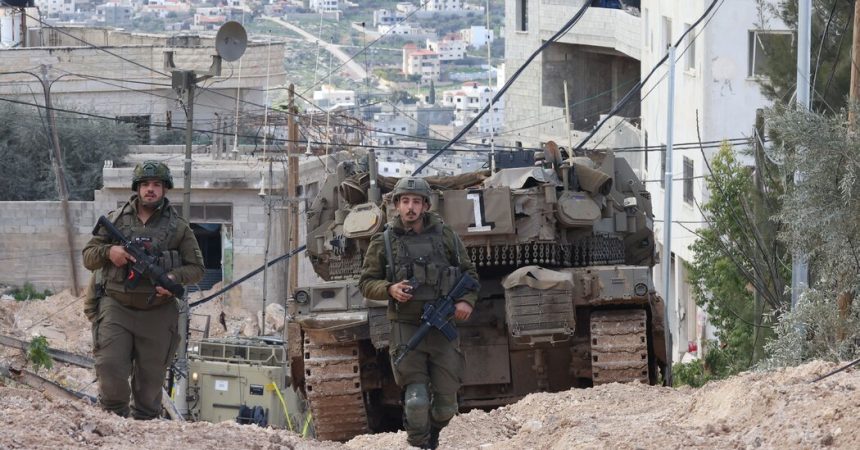Israeli operations against militants in the West Bank have escalated to a level not seen since the Second Intifada of the early 2000s. Tens of thousands have been forced to flee their homes, with Israel’s defense minister saying they will not be allowed to return. And for the first time in two decades, Israeli forces have sent tanks into the city of Jenin and established a military post in another, Tulkarm.
Israel appears to be laying the groundwork for a prolonged military presence in the area, and Palestinian officials are warning of a “dangerous escalation” that risks both a new generation of displacement and putting parts of the West Bank back under military control.
Here’s what to know about what is happening in the West Bank.
The biggest displacement in the West Bank since the 1967 war.
Just two days after Israel’s cease-fire with Hamas went into effect in Gaza on Jan. 19, Israeli forces shifted their focus to militants in the northern West Bank, namely Jenin, Tulkarm, and Tubas — and particularly on the refugee camps there.
Palestinians fear these expanding operations mask a plan for widespread displacement and reassertion of Israeli control over areas administered by the Palestinian Authority, the semiautonomous body that has run parts of the West Bank since the 1993 Oslo Accords.
Experts estimate that since Jan. 21, when the latest Israeli operation began, 40,000 people have been displaced. They are now sheltering everywhere from wedding halls and schools to mosques and municipal buildings.
Although about 3,000 people have since returned home in Tubas, where military operations have ended, the displacement of so many people evoked painful memories of the Nakba, the Arabic word that has been used to refer to the mass flight and expulsion of Palestinians during the 1948 war that created Israel. Most Palestinians forced to flee now are from the refugee camps made to house those displaced in 1948.
Israel vows an operation “as long as needed”
Israel says the campaign is a response to a rising threat of militancy from the West Bank. The Israeli military denies any forced evacuations, but has said it ordered people to leave buildings close to what it said were militant hide-outs.
On Sunday, Israel sent three tanks into the West Bank, after bombs exploded on three empty buses in Tel Aviv last Thursday and a fourth explosive was found and dismantled. No casualties were reported, but the police have said the devices resembled explosives made in the West Bank, and the news shocked Israelis, who feared a return to the deadly bombings of the mid-1990s and early 2000s.
Earlier this month, two Israeli soldiers were killed as the military broadened its campaign in the West Bank, not long after the Palestinian Authority had begun its own deadly operation against militants in the territory.
Benjamin Netanyahu, Israel’s prime minister, said on Sunday that Israeli forces would remain in the West Bank “as long as needed.” Israel Katz, the defense minister, said he had told the military “not to allow residents to return and terrorism to grow back.”
The comments came after both leaders visited a neighborhood in the Tulkarm refugee camp, an appearance seen as provocative to Palestinians because the region is under the control of the Palestinian Authority.
Palestinians fear expanding Israeli military control.
Palestinian municipal officials in Jenin say there are also indications that Israeli forces are seeking to impose long-term control over parts of the northern West Bank.
Mohammad Jarrar, the mayor of Jenin, said Israeli authorities sought to persuade locally elected officials to reopen the city despite ongoing Israeli military operations. They proposed plans to build new roads and, more alarmingly to the Palestinians, to turn the Jenin refugee camp into a district of the town. That could effectively force out UNRWA, the United Nations agency for Palestinian refugees, and shake up the social fabric of Jenin. But Mr. Jarrar said Israeli officials appeared determined to move forward with the plan without their consent.
The efforts also appear to be an attempt by Israel to sideline the Palestinian Authority, local officials have said.
“They want people to coexist and accept their presence in the area — this suggests a long-term plan,” Mr. Jarrar said. “What is happening in Jenin can only be described as a re-occupation of the city.”
Israeli West Bank operations have caused widespread destruction.
Last year, the Israeli Defense Forces mounted some of their most damaging campaigns in the West Bank in decades. The campaigns this year unleashed a new wave of devastation, according to local officials.
The head of the refugee camp services in Tulkarm, Faisal Salameh, said that because of widespread raids in recent weeks, two refugee camps in Tulkarm city are under lockdown, and in some districts, shopkeepers have been harassed and detained for hours.
In Jenin, some 120 homes have been demolished, according to the local authorities, while local officials say more than 50 buildings have been demolished in Tulkarm.
Bulldozers have ripped up swaths of road and severed sewage lines. Electricity, water and communications services have been cut off in many areas.
Mr. Jarrar said that despite the ongoing campaigns, Israeli forces had asked officials in his city to begin work repaving roads, a request he called “absurd” because roads that have been repeatedly repaved are then ripped up by Israeli vehicles, creating work that has pushed the local authorities toward bankruptcy.
In another move that drew local suspicions, Israel offered to pay for the repaving, something Mr. Jarrar said locals could never accept.
“We refuse to cooperate with the occupation in any form,” the mayor said.






